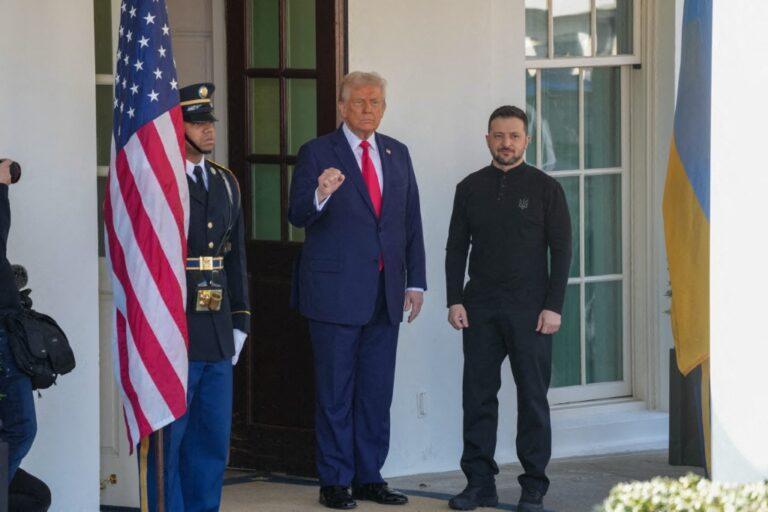Zelensky’s Optimism Amid Tensions
In a recent interview with Fox News, Ukrainian President Volodymyr Zelensky expressed a cautious optimism about mending his relationship with the United States, particularly with former President Donald Trump. This statement comes in the aftermath of a heated exchange in the Oval Office, where Trump accused Zelensky of failing to pursue peace with Russia. Despite the tensions, Zelensky emphasized that the relationship between the U.S. and Ukraine extends beyond personal dynamics, highlighting the critical need for American support in Ukraine’s ongoing battle against a far superior Russian military.
Zelensky’s comments were made shortly after a dramatic encounter at the White House, where longstanding U.S. policies aimed at supporting Ukraine were seemingly called into question. European leaders quickly rallied around Zelensky, reaffirming their commitment to Ukraine’s defense, especially after he left the meeting without securing a crucial minerals-sharing agreement that could pave the way for a U.S.-mediated ceasefire.
A Chaotic Confrontation
The confrontation in the Oval Office was marked by intense accusations. Trump and Vice President JD Vance confronted Zelensky, alleging a lack of gratitude and a refusal to accept their proposed terms for peace. Trump bluntly stated, ‘You don’t have the cards right now,’ warning Zelensky that if an agreement wasn’t reached, Ukraine would be left to fend for itself. This exchange left the Ukrainian leader visibly shaken as he exited the meeting, prompting Trump to later declare on social media that Zelensky could return only when he was prepared for peace.
Treasury Secretary Scott Bessent, who witnessed the altercation, later confirmed that the Ukrainian delegation was asked to leave the room, which added to the dramatic nature of the confrontation. Following this incident, Trump suggested that Zelensky was ‘overplaying his hand’ and should agree to cease fighting ‘immediately.’ Despite the pressure, Zelensky maintained his stance and refused to apologize for the exchange, expressing regret that it had occurred in front of the media.
Calls for Apologies and Support for Ukraine
In the wake of the Oval Office incident, U.S. Secretary of State Marco Rubio called on Zelensky to apologize for ‘wasting our time,’ reflecting a growing sentiment among some U.S. officials regarding the nature of the confrontation. Meanwhile, European allies quickly stepped up to support Zelensky, fearing that Trump might push Ukraine towards conceding to Russian President Vladimir Putin. Polish Prime Minister Donald Tusk assured Zelensky, ‘You are not alone,’ while British Prime Minister Keir Starmer reiterated unwavering support during a call following the incident.
The urgency of the situation was echoed by far-right Italian Prime Minister Giorgia Meloni, who advocated for an immediate summit involving the U.S., Europe, and their allies to address the ongoing crisis in Ukraine. On the other hand, criticism of Zelensky from Trump’s Republican Party aligned with Russian narratives, depicting him as ungrateful. However, back in Ukraine, support for Zelensky remained strong, with military leaders and citizens rallying behind their president, reaffirming his bravery in the face of adversity.
The Compromise Debate
Tensions further escalated as Trump suggested that Ukraine might need to make ‘compromises’ in any future ceasefire negotiations with Russia. Zelensky firmly countered, asserting that there should be ‘no compromises with a killer on our territory.’ This statement highlighted the stark divide in perspectives on how to navigate the conflict, as Zelensky pointed out the failures of previous peace efforts supported by the West.
As the discussion heated up, Vice President Vance interrupted, accusing Zelensky of being ‘disrespectful.’ This back-and-forth illustrated the growing rift between Zelensky and U.S. leadership, particularly as Trump positioned himself as a mediator in the conflict without explicitly condemning the Russian invasion. Trump’s recent comments, referring to Zelensky as a ‘dictator’ and expressing trust in Putin to honor a ceasefire, have raised alarm among both Ukrainian and European leaders.
Zelensky’s Wish for Stronger U.S. Support
In the aftermath of the confrontation, Zelensky conveyed a desire for Trump to be more supportive of Ukraine, expressing his hope that the former president would take a firmer stance against Russian aggression. His comments reflect a broader concern among Ukrainian leadership regarding the shifting dynamics in U.S. foreign policy, particularly under Trump’s influence.
As diplomatic tensions continue to rise, hostilities in Ukraine are far from abating. Reports indicated that Russian forces were advancing on the Ukrainian border from the Kursk region, underscoring the urgency for a cohesive international response. Zelensky’s leadership and the support he garners from both domestic and international allies will be critical in navigating these turbulent times.






